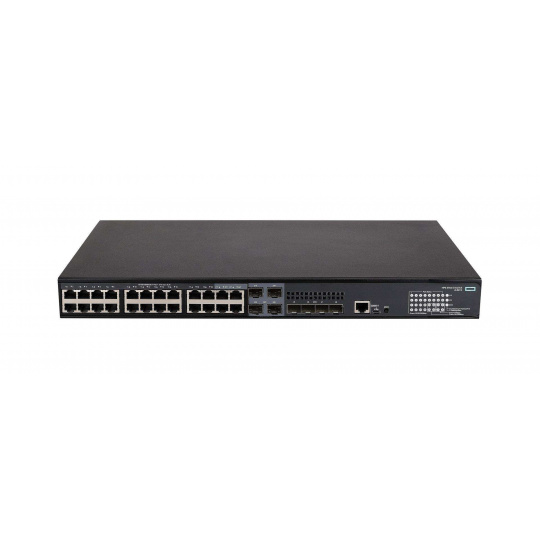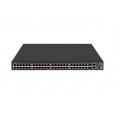HPE FlexNetwork 5140 24G PoE+ 4SFP+ EI Switch
HPE FlexNetwork 5140 24G PoE+ 4SFP+ EI Switch
HPE FlexNetwork 5140 48G 4SFP+ EI Switch (JL829A)
The HPE FlexNetwork 5140 EI Switch Series comprises Gigabit Ethernet switches that support static, OSPF and RIP Layer 3 routing, convenient fixed 10GbE uplink ports, PoE+, ACLs, IPv6 and delivers energy savings with Energy Efficient Ethernet.
Unique Intelligent Resilient Fabric (IRF) technology creates a virtual fabric by managing several switches as one logical device, which increases network resilience, performance, and availability, while reducing operational complexity. These switches provide Gigabit Ethernet access and can be used at the edge of a network or to connect server clusters in small data centers.
High availability, simplified management, and comprehensive security control policies are among the key features that distinguish this series.
| I/O ports and slots | 48 RJ-45 autosensing 10/100/1000 ports (IEEE 802.3 Type 10BASE-T, IEEE 802.3u Type 100BASE-TX, IEEE 802.3ab Type 1000BASE-T); Duplex: 10BASE-T/100BASE-TX: half or full; 1000BASE-T: full only | |
| 4 SFP+ fixed 1000/10000 SFP+ ports | ||
| Additional ports and slots | 1 RJ-45 serial console port | |
| Physical characteristics | Dimensions | 17.32(w) x 9.04(d) x 1.72(h) in (44 x 23 x 4.36 cm) (1U height) |
| Weight | 7.72 lb (3.5 kg) | |
| Memory and processor | 512 MB SDRAM, 256 MB flash | |
| Mounting and enclosure | Mounts in an EIA standard 19-inch telco rack or equipment cabinet (Rack Mount Kit R8M91A sold separately) | |
| Performance | IPv6 Ready Certified | |
| 1000 Mb Latency | < 5 µs | |
| 10 Gbps Latency | < 3 µs | |
| Throughput | 131 Mpps | |
| Routing/Switching capacity | 176 Gbps | |
| Routing table size | 1024 entries | |
| MAC address table size | 16384 entries | |
| Environment | Operating temperature | 23°F to 113°F (-5°C to 45°C) |
| Operating relative humidity | 10% to 90%, noncondensing | |
| Non-operating/Storage temperature | -40°F to 158°F (-40°C to 70°C) | |
| Non-operating/Storage relative humidity | 5% to 95%, noncondensing | |
| Acoustic | Low-speed fan: 42.2 dB, High-speed fan: 49.3 dB; ISO 7779 | |
| Electrical characteristics | Frequency | 50/60 Hz |
| Maximum heat dissipation | 130/153 BTU/hr (137.15/161.42 kJ/hr), For AC powered units. For DC powered units heat dissipation is 130 BTU/hr min, 171 BTU/hr max | |
| Voltage | 100 - 240 VAC -48 to -60 VDC | |
| Current | 10 A | |
| Maximum power rating | 44 W | |
| Idle power | 38 W | |
| Notes: | - Idle power is the actual power consumption of the device with no ports connected. - Maximum power rating and maximum heat dissipation are the worst-case theoretical maximum numbers provided for planning the infrastructure with fully loaded PoE (if equipped), 100% traffic, all ports plugged in, and all modules populated. - Power ratings for AC power indicated above. Current used is 5A Max when DC Power used. For DC input power, idle power is 38W, maximum DC power used is 50W. | |
| Safety | UL 60950-1; EN 60825-1 Safety of Laser Products-Part 1; EN 60825-2 Safety of Laser Products-Part 2; IEC 60950-1; IEC 62368-1; CAN/CSA-C22.2 No. 60950-1; EN 62368-1/A11; FDA 21 CFR Subchapter J; ROHS Compliance | |
| Emissions | FCC Part 15 Subpart B CLASS A; ICES-003 CLASS A; VCCI-CISPR 32 CLASS A; EN 55032 CLASS; AS/NZS CISPR32 CLASS A; CISPR 24; EN 55024; EN 61000-3-2; EN 61000-3-3; ETSI EN 300 386; GB/T 9254; YD/T 993 | |
| Immunity | Generic | EN 55024 |
| ESD | EN300 386 | |
| Management | IMC - Intelligent Management Center; SmartMC; command-line interface; Web browser; SNMP Manager | |
| Services | Refer to the Hewlett Packard Enterprise website at http://www.hpe.com/networking/services for details on the service-level descriptions and product numbers. For details about services and response times in your area, please contact your local Hewlett Packard Enterprise sales office. | |
| HPE FlexNetwork 5140 24G PoE+ 4SFP+ (370W) EI Switch (JL827A ) | ||
| I/O ports and slots | 24 RJ-45 autosensing 10/100/1000 ports (IEEE 802.3 Type 10BASE-T, IEEE 802.3u Type 100BASE-TX, IEEE 802.3ab Type 1000BASE-T) with 4 combo ports (RJ-45 or SFP); Duplex: 10BASE-T/100BASE-TX: half or full; 1000BASE-T: full only | |
| Additional ports and slots | 1 RJ-45 serial console port | |
| Physical characteristics | Dimensions | 17.32(w) x 10.24(d) x 1.72(h) in (44 x 26 x 4.36 cm) (1U height) |
| Weight | 17.64 lb (8 kg) | |
| Memory and processor | 512 MB SDRAM, 256 MB flash | |
| Mounting and enclosure | Mounts in an EIA standard 19-inch telco rack or equipment cabinet (Rack Mount Kit R8M91A sold separately) | |
| Performance | IPv6 Ready Certified | |
| 1000 Mb Latency | < 5 µs | |
| 10 Gbps Latency | < 3 µs | |
| Throughput | 95 Mpps | |
| Routing/Switching capacity | 128 Gbps | |
| Routing table size | 1024 entries | |
| MAC address table size | 16384 entries | |
| Environment | Operating temperature | 23°F to 113°F (-5°C to 45°C) |
| Operating relative humidity | 10% to 90%, noncondensing | |
| Non-operating/Storage temperature | -40°F to 158°F (-40°C to 70°C) | |
| Non-operating/Storage relative humidity | 5% to 95%, noncondensing | |
| Acoustic | Low-speed fan: 44.4 dB, High-speed fan: 53.6 dB; ISO 7779 | |
| Electrical characteristics | Frequency | 50/60 Hz | |
| Maximum heat dissipation | 102/1569 BTU/hr (107.61/1655.29 kJ/hr), for AC Power. For DC Power min heat dissipation is 85 BTU/hr and max heat dissipation is 2695 BTU/hr | ||
| Voltage | 100 - 240 VAC, -54 to -57 VDC | ||
| Current | 10 A | ||
| Maximum power rating | 451 W | ||
| Idle power | 30 W | ||
| PoE power | 370 W PoE+ | ||
| Notes: | - Maximum power rating and maximum heat dissipation are the worst-case theoretical maximum numbers provided for planning the infrastructure with fully loaded PoE (if equipped), 100% traffic, all ports plugged in, and all modules populated. PoE Power is the power supplied by the internal power supply. When supplemented with the use of an HPE RPS1600 Redundant Power System, up to 740 W of PoE+ can be supplied. - Max current rating for DC power is 25A. AC Input power is 30W typical, and 460W max(including 370W PoE+ consumption. DC Input voltage range is -54 to -57VDC. Total DC input power is 25W Typical and 790W with 740W PoE+ Power consumption. DC Input voltage range is -54VDC to -57VDC. DC Input Source is the HPE RPS1600. | ||
| Safety | UL 60950-1; EN 60825-1 Safety of Laser Products-Part 1; EN 60825-2 Safety of Laser Products-Part 2; IEC 60950-1; IEC 62368-1; CAN/CSA-C22.2 No. 60950-1; EN 62368-1/A11; FDA 21 CFR Subchapter J; ROHS Compliance | ||
| Emissions | FCC Part 15 Subpart CLASS A; ICES-003 CLASS A; VCCI-CISPR 32 CLASS A; EN 55032 CLASS; AS/NZS CISPR32 CLASS A; CISPR 24; EN 55024; EN 61000-3-2; EN 61000-3-3; ETSI EN 300 386; GB/T 9254; YD/T 993 | ||
| Immunity | Generic | EN 55024 | |
| ESD | EN300 386 | ||
| Management | IMC - Intelligent Management Center; SmartMC; command-line interface; Web browser; SNMP Manager. | ||
| Services | Refer to the Hewlett Packard Enterprise website at http://www.hpe.com/networking/services for details on the service-level descriptions and product numbers. For details about services and response times in your area, please contact your local Hewlett Packard Enterprise sales office. | ||
| Models | |
| HPE FlexNetwork 5140 24G POE+2SFP+2XGT EI Switch | JL823A |
| HPE FlexNetwork 5140 48G PoE+ 4SFP+ EI Switch | JL824A |
| HPE FlexNetwork 5140 48G POE+ 2SFP+ 2XGT EI Switch | JL825A |
| HPE FlexNetwork 5140 24G SFP w/8G Combo 4SFP+ EI Switch | JL826A |
| HPE FlexNetwork 5140 24G PoE+ 4SFP+ EI Switch | JL827A |
| HPE FlexNetwork 5140 24G 4SFP+ EI Switch | JL828A |
| HPE FlexNetwork 5140 48G 4SFP+ EI Switch | JL829A |
| HPE FlexNetwork 5140 24G 2SFP+ 2XGT EI Switch | R8J41A |
| HPE FlexNetwork 5140 8G 2SFP 2GT Combo EI Switch | R8J42A |
| Key features | |
| |
Standard Features
| Software-defined networking
|
| Quality of Service (QoS)
Classifies traffic using multiple match criteria based on Layer 2, 3, and 4 information; applies QoS policies such as setting priority level and rate limit to selected traffic on a port, VLAN, or whole switch
|
| Connectivity
Simplifies deployment and dramatically reduces installation costs by helping to eliminate the time and cost involved in supplying local power at each access point location
|
| Resiliency and high availability
Creates virtual resilient switching fabrics, where two or more switches perform as a single L2 switch and L3 router; switches do not have to be co-located and can be part of a disaster-recovery system; servers or switches can be attached using standard LACP for automatic load balancing and high availability; can eliminate the need for complex protocols like Spanning Tree Protocol, (), or VRRP, thereby simplifying network operation |
| Layer 3 routing
An Interior Gateway Protocol (IGP) that uses a link state routing algorithm; supports OSPFv1/v2 and OSPFv3
Uses a distance vector algorithm with UDP packets for route determination; supports RIPv1 and RIPv2 routing; includes loop protection |
| Management
Leverages HWTACACS to link a custom list of CLI commands to an individual network administrator's login; also provides an audit trail
Uses standard SNMP to monitor essential network functions; supports events, alarm, history, and statistics group plus a private alarm extension group
Advertises and receives management information from adjacent devices on a network, facilitating easy mapping by network management applications
Provides scalable ASIC-based wirespeed network monitoring and accounting with no impact on network performance; this allows network operators to gather a variety of sophisticated network statistics and information for capacity planning and real-time network monitoring purposes
Mirrors ingress ACL-selected traffic from a switch port or VLAN to a local or remote switch port anywhere on the network
Monitors a cable between two compatible switches and shuts down the ports on both ends if the cable is broken, which prevents network problems such as loops
Provides future-proof networking because the switch is capable of being managed whether the attached network is running IPv4 or IPv6; supports pingv6, tracertv6, Telnetv6, TFTPv6, DNSv6, syslogv6, FTPv6, SNMPv6, DHCPv6, and RADIUS for IPv6
Ingress and egress port monitoring enables network problem-solving; virtual cable tests provide visibility into cable problems
Embedded network management tool with a web-based GUI to simplify operations and facilitate centralized management. It is made available at no additional cost and offers centralized configuration backup, software version management and seamless switch replacement.
Integrates fault management, element configuration, and network monitoring from a central vantage point; built-in support for third-party devices enables network administrators to centrally manage all network elements with a variety of automated tasks, including discovery, categorization, baseline configurations, and software images; the software also provides configuration comparison tools, version tracking, change alerts, and more
SNMP v1/v2c/v3, MIB-II with Traps, and RADIUS Authentication Client MIB (RFC 2618); embedded HTML management tool with secure access |
| Security
Industry-standard method of user authentication using an IEEE 802.1X supplicant on the client in conjunction with a RADIUS server
- Per-user ACLs Permits or denies user access to specific network resources based on user identity and time of day, allowing multiple types of users on the same network to access specific network services without risking network security or providing unauthorized access to sensitive data - Automatic VLAN assignment Automatically assigns users to the appropriate VLAN based on their identities
Allows secure file transfer to and from the switch; protects against unwanted file downloads or unauthorized copying of a switch configuration file
|
| Performance
Help provide high levels of security and ease of administration without impacting network performance with a feature-rich TCAM-based ACL implementation |
| Device support
|
| Convergence
Provides up to 30 W per port that allows support of the latest PoE+-capable devices such as IP phones, wireless access points, and security cameras, as well as any IEEE 802.3af-compliant end device; eliminates the cost of additional electrical cabling and circuits that would otherwise be necessary in IP phone and WLAN deployments
Supports multiple methods (automatic, IEEE 802.3af class, LLDP-MED, or user-specified) to allocate PoE power for more efficient energy savings
|
| Additional information
Improves energy efficiency through the use of the latest advances in silicon development; shuts off unused ports and utilizes variable-speed fans, reducing energy costs
Provides an easy-to-enhance-and-extend feature set, which doesn't require whole-scale changes; all switching, routing, and security platforms leverage the Comware OS, a common unified modular operating system |
| Energy Efficient Ethernet (EEE) Support Reduces power consumption in accordance with IEEE 802.3az |
| Layer 2 switching
Increase the scalability of an Ethernet network by providing a hierarchical structure; connect multiple LANs on a high-speed campus or metro network
Monitors link connectivity and shuts down ports at both ends if unidirectional traffic is detected, preventing loops in STP-based networks
|
| Layer 3 services
Determines the MAC address of another IP host in the same subnet; supports static ARPs; gratuitous ARP allows detection of duplicate IP addresses; proxy ARP allows normal ARP operation between subnets or when subnets are separated by a Layer 2 network
Simplifies the management of large IP networks; supports client; DHCP Relay enables DHCP operation across subnets
Allows UDP broadcasts to be directed across router interfaces to specific IP unicast or subnet broadcast addresses and prevents server spoofing for UDP services such as DHCP
|
| Warranty and support
See Warranty check for warranty and support information included with your product purchase.
To find software for your product, refer to http://www.hpe.com/networking/support; for details on the software releases available with your product purchase, refer to Warranty check |
.
, ,
Táto položka nebola doposiaľ diskutovaná. Ak chcete byť prvý, kliknite na tlačidlo Přidat příspěvek




